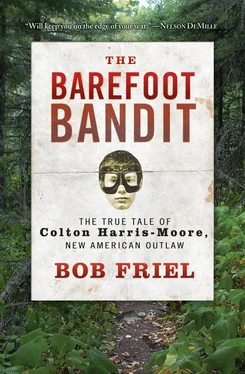The drizzle passed after a couple of minutes and everything fell silent again as I slipped back to sleep.
The next morning, Jeremy Trumble woke to find there’d been a B and E at his B and B, the Inn on Orcas Island, one mile away through the woods from our cabin.
Both Jeremy and his partner, John Gibbs, had come from East Los Angeles. “I was a high school teacher in a ghetto school, but I wasn’t teaching, I was surviving,” says Trumble. “I told John about this place where my mom and dad took me in the fifties, this wonderful, wonderful island with no crime where running a B and B would be the perfect semiretirement lifestyle.”
They traveled to Orcas four times a year starting in the mid-eighties to look for just the right property. “Orcas has a drawbridge mentality, not real welcoming for development, but we persevered and in ’94 we found this property. We sat here on the grass and it was one of those August days… ”
Their six acres overlook a tidal wetland attended by stately blue herons. It took five years to get permits to replace the existing double-wide trailer with what is now an exquisite coastal inn. They finally opened in the summer of 2002.
The inn’s kitchen faces the wetland and woods beyond, and they never bothered to put curtains on the windows. Gibbs had been sitting in the kitchen working on his laptop until 11:30 the previous evening. Guests filled all the upstairs rooms, every bedroom window wide open to enjoy the cool night air. Nine cars lined the lot, outside lights lit the exterior of the inn and its surroundings.
“The doors were all locked except the French doors on the little deck off the kitchen,” says Trumble. “We never thought they needed to be locked when we had a full house and all the windows open. Our suite lies just above that deck.”
Sometime between when Gibbs went to bed and 5 a.m., when Trumble got up to start breakfast, someone walked—barefoot—through the landscaped patch around the deck and climbed up and over the railing. Dirty footprints led into the kitchen. The laptop had disappeared. The innkeepers called the police and began a long series of calls to cancel all the accounts that had been on the computer—PayPal, Amazon, credit cards.
“John’s wallet was close by and he didn’t take that,” but because of what had happened across the road at Ryan Carpenter’s Deer Harbor Inn they worried about all of their other credit cards, too. The inn represented every dime they had plus twenty years of hard work just to make it a reality. Like most other Orcas tourist-related businesses, it operated on a knife edge of profitability. The computer’s value didn’t meet their deductible, so the loss was all out-of-pocket.
“It breaks my heart that this happened on Orcas,” says Trumble. “Suddenly we had to change our lifestyle and start really watching… You’re not as safe as you thought you were.”
After the break-in, Trumble, one of the most gentle guys on the island, found himself sleeping with a baseball bat next to his bed.
The deputy who responded to the call lived just down the road aboard a boat at the Deer Harbor Marina. The same night as the burglary at the inn, someone walked down the marina’s long wooden pier and ducked behind the dockmaster’s office. He slid a thin tool between window sashes and opened a latch. Inside, he had access to a computer and the safe—with its key hanging nearby. But he left those alone and instead took only the surveillance cameras and the DVR they were attached to.
Deer Harbor Marina enjoys a brisk trade with visiting boaters. During July and August there’s rarely an open slip, with half leased to full-timers and the other half filled with boats from all over Washington and British Columbia. That night, the place was packed, the docks alive with people wandering up and down, visiting with fellow boaters, barbecuing, boiling up the day’s Dungeness crab, cocktailing, telling tall tales, and doing all the other stuff yachties do. Things quiet down in Deer Harbor after 11 p.m., but many boaters remain up on deck chatting under the brilliant stars, their voices and the creak of boats carrying far across the still water.
The marina’s showers and bathrooms sit back by the dockmaster’s office, forty yards up the pier from the marina store and the boat slips. There’s always a trickle of folks heading back and forth to the restrooms. That didn’t bother this burglar, though, who strolled from the office to the store and slid open another window. Inside, surrounded by coolers filled with beer, water, and soda, along with racks and racks of snack foods, candy, and wine as well as a complete ice cream shop, the burglar chose to take only the surveillance cameras and DVR.
Word of the break-ins quickly echoed around Deer Harbor. Now my hackles went up. There’d be no reason for someone to have gone into our crawlspace unless he was just getting out of the rain. But we’re so far at the end of the road surrounded by acres and acres of nothing but woods that even that didn’t make sense. I went underneath and found a vent pipe knocked out of place. It still had to be a deer, I thought, but Sandi and I spent an hour digging around for the single house key we owned and went to make a copy. We started taking the keys out of our cars and locking the house overnight, just like back in the city.
That night as we lay in bed with the big black window behind our heads, the woods outside seemed darker.
* * *
The action moved back to Eastsound just before Labor Day weekend, the last big opportunity for local businesses to rake in summer money. Early morning on September 1, a burglar forced his way into the popular Sunflower Café on the prime corner of Main Street and North Beach. He took $300 out of the till and $3,280 from the ATM before crossing the street to Vern’s Bayside.
Belinda and Marion had installed surveillance cameras inside and out after the 2008 hit. Now, one by one, the cameras went dark.
“He WHALED on them with his fist,” says Belinda. Then he pried open the side door and went inside the restaurant. A camera in the dining room captured a tall white male wearing a tan T-shirt walking past using a black shirt to cover his face. The burglar went directly to Marion’s office, which sits nooked away in a nonobvious spot up a short flight of stairs from the kitchen. A tiny camera mounted on the office ceiling watched as he came through the door and instantly rounded the divider to shine his flashlight at the empty space where the safe had been the year before. He swung his light around quickly, but couldn’t figure out where they’d moved it.
At that point, the computer attached to the security cameras began to beep. The burglar bolted full speed out of the office and back out the way he came.
Just down the street, Suzanne Lyons was sleeping in her jewelry store, Orcas Arts and Gifts. Lyons has had some experience with at-risk youth.
“When I lived in California,” she says, “I took in five ten-year-old boys as foster kids from really bad families, moms were hookers and everything, but I got them early enough. Four joined the service, and they all turned out okay.”
Suzanne’s family had been taking turns bunking in their little shop ever since her daughter, Erica, had been woken by a noise in the middle of the night shortly after the stolen boat had shown up. Erica went outside to check and found a very tall young man standing in the private yard between the store and their home. He calmly looked at her for a long moment, then vaulted over the six-foot-high fence and disappeared.
They called the deputies, but they couldn’t find the guy. Now, on September 1, it was Suzanne who sensed something was not right. She stepped outside.
“I was in my robe and bunny slippers,” she says, laughing. “I saw this big guy running down Main Street away from Vern’s. I wasn’t really dressed to chase him, though.”
Читать дальше












